The Death of Wallenstein - Friedrich Schiller (simple e reader txt) 📗
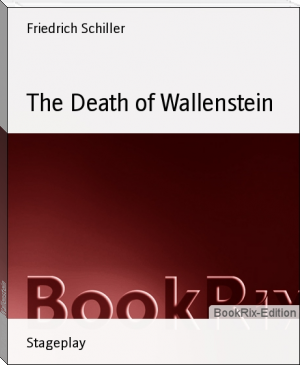
- Author: Friedrich Schiller
Book online «The Death of Wallenstein - Friedrich Schiller (simple e reader txt) 📗». Author Friedrich Schiller
- Hadst thou the heart to wish to see him guilty Rather than saved? Thou risest by his fall. Octavio, 'twill not please me.
OCTAVIO.
God in heaven!
MAX. Oh, woe is me! sure I have changed my nature. How comes suspicion here - in the free soul? Hope, confidence, belief, are gone; for all Lied to me, all that I e'er loved or honored. No, no! not all! She - she yet lives for me, And she is true, and open as the heavens Deceit is everywhere, hypocrisy, Murder, and poisoning, treason, perjury: The single holy spot is our love, The only unprofaned in human nature.
OCTAVIO. Max.! - we will go together. 'Twill be better.
MAX. What? ere I've taken a last parting leave, The very last - no, never!
OCTAVIO.
Spare thyself The pang of necessary separation. Come with me! Come, my son!
[Attempts to take him with him.
MAX. No! as sure as God lives, no!
OCTAVIO (more urgently). Come with me, I command thee! I, thy father.
MAX. Command me what is human. I stay here.
OCTAVIO. Max.! in the emperor's name I bid thee come.
MAX. No emperor has power to prescribe Laws to the heart; and wouldst thou wish to rob me Of the sole blessing which my fate has left me, Her sympathy? Must then a cruel deed Be done with cruelty? The unalterable Shall I perform ignobly - steal away, With stealthy coward flight forsake her? No! She shall behold my suffering, my sore anguish, Hear the complaints of the disparted soul, And weep tears o'er me. Oh! the human race Have steely souls - but she is as an angel. From the black deadly madness of despair Will she redeem my soul, and in soft words Of comfort, plaining, loose this pang of death!
OCTAVIO. Thou wilt not tear thyself away; thou canst not. Oh, come, my son! I bid thee save thy virtue.
MAX. Squander not thou thy words in vain. The heart I follow, for I dare trust to it.
OCTAVIO (trembling, and losing all self-command). Max.! Max.! if that most damned thing could be, If thou - my son - my own blood - (dare I think it?) Do sell thyself to him, the infamous, Do stamp this brand upon our noble house, Then shall the world behold the horrible deed, And in unnatural combat shall the steel Of the son trickle with the father's blood.
MAX. Oh, hadst thou always better thought of men, Thou hadst then acted better. Curst suspicion, Unholy, miserable doubt! To him Nothing on earth remains unwrenched and firm Who has no faith.
OCTAVIO.
And if I trust thy heart, Will it be always in thy power to follow it?
MAX. The heart's voice thou hast not o'erpowered - as little Will Wallenstein be able to o'erpower it.
OCTAVIO. O, Max.! I see thee never more again!
MAX. Unworthy of thee wilt thou never see me.
OCTAVIO. I go to Frauenberg - the Pappenheimers I leave thee here, the Lothrings too; Tsokana And Tiefenbach remain here to protect thee. They love thee, and are faithful to their oath, And will far rather fall in gallant contest Than leave their rightful leader and their honor.
MAX. Rely on this, I either leave my life In the struggle, or conduct them out of Pilsen.
OCTAVIO. Farewell, my son!
MAX.
Farewell!
OCTAVIO.
How! not one look Of filial love? No grasp of the hand at parting? It is a bloody war to which we are going, And the event uncertain and in darkness. So used we not to part - it was not so! Is it then true? I have a son no longer?
[MAX. falls into his arms, they hold each other for a long time
in a speechless embrace, then go away at different sides.
(The curtain drops.)
ACT III.
SCENE I.
A chamber in the house of the Duchess of Friedland.
COUNTESS TERZKY, THEKLA, LADY NEUBRUNN (the two latter sit
at the same table at work).
COUNTESS (watching them from the opposite side). So you have nothing to ask me - nothing? I have been waiting for a word from you. And could you then endure in all this time Not once to speak his name?
[THEKLA remaining silent, the COUNTESS rises and advances to her.
Why, how comes this? Perhaps I am already grown superfluous, And other ways exist, besides through me Confess it to me, Thekla: have you seen him?
THEKLA. To-day and yesterday I have not seen him.
COUNTESS. And not heard from him, either? Come, be open.
THEKLA. No Syllable.
COUNTESS.
And still you are so calm?
THEKLA. I am.
COUNTESS.
May it please you, leave us, Lady Neubrunn.
[Exit LADY NEUBRUNN.
SCENE II.
The COUNTESS, THEKLA.
COUNTESS. It does not please me, princess, that he holds Himself so still, exactly at this time.
THEKLA. Exactly at this time?
COUNTESS.
He now knows all 'Twere now the moment to declare himself.
THEKLA. If I'm to understand you, speak less darkly.
COUNTESS. 'Twas for that purpose that I bade her leave us. Thekla, you are no more a child. Your heart Is no more in nonage: for you love, And boldness dwells with love - that you have proved Your nature moulds itself upon your father's More than your mother's spirit. Therefore may you Hear what were too much for her fortitude.
THEKLA. Enough: no further preface, I entreat you. At once, out with it! Be it what it may, It is not possible that it should torture me More than this introduction. What have you To say to me? Tell me the whole, and briefly!
COUNTESS. You'll not be frightened - -
THEKLA.
Name it, I entreat you.
COUNTESS. Lies within my power to do your father A weighty service - -
THEKLA.
Lies within my power.
COUNTESS. Max. Piccolomini loves you. You can link him Indissolubly to your father.
THEKLA.
I? What need of me for that? And is he not Already linked to him?
COUNTESS.
He was.
THEKLA.
And wherefore Should he not be so now - not be so always?
COUNTESS. He cleaves to the emperor too.
THEKLA.
Not more than duty And honor may demand of him.
COUNTESS.
We ask Proofs of his love, and not proofs of his honor. Duty and honor! Those are ambiguous words with many meanings. You should interpret them for him: his love Should be the sole definer of his honor.
THEKLA. How?
COUNTESS. The emperor or you must he renounce.
THEKLA. He will accompany my father gladly In his retirement. From himself you heard, How much he wished to lay aside the sword.
COUNTESS. He must not lay the sword aside, we mean; He must unsheath it in your father's cause.
THEKLA. He'll spend with gladness and alacrity His life, his heart's blood in my father's cause, If shame or injury be intended him.
COUNTESS. You will not understand me. Well, hear then: Your father has fallen off from the emperor, And is about to join the enemy With the whole soldiery - -
THEKLA.
Alas, my mother!
COUNTESS. There needs a great example to draw on The army after him. The Piccolomini Possess the love and reverence of the troops; They govern all opinions, and wherever They lead the way, none hesitate to follow. The son secures the father to our interests - You've much in your hands at this moment.
THEKLA.
Ah, My miserable mother! what a death-stroke Awaits thee! No! she never will survive it.
COUNTESS. She will accommodate her soul to that Which is and must be. I do know your mother: The far-off future weighs upon her heart With torture of anxiety; but is it Unalterably, actually present, She soon resigns herself, and bears it calmly.
THEKLA. O my foreboding bosom! Even now, E'en now 'tis here, that icy hand of horror! And my young hope lies shuddering in its grasp; I knew it well - no sooner had I entered, An heavy ominous presentiment Revealed to me that spirits of death were hovering Over my happy fortune. But why, think I First of myself? My mother! O my mother!
COUNTESS.
Calm yourself! Break not out in vain lamenting! Preserve you for your father the firm friend, And for yourself the lover, all will yet Prove good and fortunate.
THEKLA.
Prove good! What good? Must we not part; part ne'er to meet again?
COUNTESS. He parts not from you! He cannot part from you.
THEKLA. Alas, for his sore anguish! It will rend His heart asunder.
COUNTESS.
If indeed he loves you. His resolution will be speedily taken.
THEKLA. His resolution will be speedily taken - Oh, do not doubt of that! A resolution! Does there remain one to be taken?
COUNTESS.
Hush! Collect yourself! I hear your mother coming.
THERLA. How shall I bear to see her?
COUNTESS.
Collect yourself.
SCENE III.
To them enter the DUCHESS.
DUCHESS (to the COUNTESS). Who was here, sister? I heard some one talking, And passionately, too.
COUNTESS.
Nay! there was no one.
DUCHESS. I am growing so timorous, every trifling noise Scatters my spirits, and announces to me The footstep of some messenger of evil. And you
OCTAVIO.
God in heaven!
MAX. Oh, woe is me! sure I have changed my nature. How comes suspicion here - in the free soul? Hope, confidence, belief, are gone; for all Lied to me, all that I e'er loved or honored. No, no! not all! She - she yet lives for me, And she is true, and open as the heavens Deceit is everywhere, hypocrisy, Murder, and poisoning, treason, perjury: The single holy spot is our love, The only unprofaned in human nature.
OCTAVIO. Max.! - we will go together. 'Twill be better.
MAX. What? ere I've taken a last parting leave, The very last - no, never!
OCTAVIO.
Spare thyself The pang of necessary separation. Come with me! Come, my son!
[Attempts to take him with him.
MAX. No! as sure as God lives, no!
OCTAVIO (more urgently). Come with me, I command thee! I, thy father.
MAX. Command me what is human. I stay here.
OCTAVIO. Max.! in the emperor's name I bid thee come.
MAX. No emperor has power to prescribe Laws to the heart; and wouldst thou wish to rob me Of the sole blessing which my fate has left me, Her sympathy? Must then a cruel deed Be done with cruelty? The unalterable Shall I perform ignobly - steal away, With stealthy coward flight forsake her? No! She shall behold my suffering, my sore anguish, Hear the complaints of the disparted soul, And weep tears o'er me. Oh! the human race Have steely souls - but she is as an angel. From the black deadly madness of despair Will she redeem my soul, and in soft words Of comfort, plaining, loose this pang of death!
OCTAVIO. Thou wilt not tear thyself away; thou canst not. Oh, come, my son! I bid thee save thy virtue.
MAX. Squander not thou thy words in vain. The heart I follow, for I dare trust to it.
OCTAVIO (trembling, and losing all self-command). Max.! Max.! if that most damned thing could be, If thou - my son - my own blood - (dare I think it?) Do sell thyself to him, the infamous, Do stamp this brand upon our noble house, Then shall the world behold the horrible deed, And in unnatural combat shall the steel Of the son trickle with the father's blood.
MAX. Oh, hadst thou always better thought of men, Thou hadst then acted better. Curst suspicion, Unholy, miserable doubt! To him Nothing on earth remains unwrenched and firm Who has no faith.
OCTAVIO.
And if I trust thy heart, Will it be always in thy power to follow it?
MAX. The heart's voice thou hast not o'erpowered - as little Will Wallenstein be able to o'erpower it.
OCTAVIO. O, Max.! I see thee never more again!
MAX. Unworthy of thee wilt thou never see me.
OCTAVIO. I go to Frauenberg - the Pappenheimers I leave thee here, the Lothrings too; Tsokana And Tiefenbach remain here to protect thee. They love thee, and are faithful to their oath, And will far rather fall in gallant contest Than leave their rightful leader and their honor.
MAX. Rely on this, I either leave my life In the struggle, or conduct them out of Pilsen.
OCTAVIO. Farewell, my son!
MAX.
Farewell!
OCTAVIO.
How! not one look Of filial love? No grasp of the hand at parting? It is a bloody war to which we are going, And the event uncertain and in darkness. So used we not to part - it was not so! Is it then true? I have a son no longer?
[MAX. falls into his arms, they hold each other for a long time
in a speechless embrace, then go away at different sides.
(The curtain drops.)
ACT III.
SCENE I.
A chamber in the house of the Duchess of Friedland.
COUNTESS TERZKY, THEKLA, LADY NEUBRUNN (the two latter sit
at the same table at work).
COUNTESS (watching them from the opposite side). So you have nothing to ask me - nothing? I have been waiting for a word from you. And could you then endure in all this time Not once to speak his name?
[THEKLA remaining silent, the COUNTESS rises and advances to her.
Why, how comes this? Perhaps I am already grown superfluous, And other ways exist, besides through me Confess it to me, Thekla: have you seen him?
THEKLA. To-day and yesterday I have not seen him.
COUNTESS. And not heard from him, either? Come, be open.
THEKLA. No Syllable.
COUNTESS.
And still you are so calm?
THEKLA. I am.
COUNTESS.
May it please you, leave us, Lady Neubrunn.
[Exit LADY NEUBRUNN.
SCENE II.
The COUNTESS, THEKLA.
COUNTESS. It does not please me, princess, that he holds Himself so still, exactly at this time.
THEKLA. Exactly at this time?
COUNTESS.
He now knows all 'Twere now the moment to declare himself.
THEKLA. If I'm to understand you, speak less darkly.
COUNTESS. 'Twas for that purpose that I bade her leave us. Thekla, you are no more a child. Your heart Is no more in nonage: for you love, And boldness dwells with love - that you have proved Your nature moulds itself upon your father's More than your mother's spirit. Therefore may you Hear what were too much for her fortitude.
THEKLA. Enough: no further preface, I entreat you. At once, out with it! Be it what it may, It is not possible that it should torture me More than this introduction. What have you To say to me? Tell me the whole, and briefly!
COUNTESS. You'll not be frightened - -
THEKLA.
Name it, I entreat you.
COUNTESS. Lies within my power to do your father A weighty service - -
THEKLA.
Lies within my power.
COUNTESS. Max. Piccolomini loves you. You can link him Indissolubly to your father.
THEKLA.
I? What need of me for that? And is he not Already linked to him?
COUNTESS.
He was.
THEKLA.
And wherefore Should he not be so now - not be so always?
COUNTESS. He cleaves to the emperor too.
THEKLA.
Not more than duty And honor may demand of him.
COUNTESS.
We ask Proofs of his love, and not proofs of his honor. Duty and honor! Those are ambiguous words with many meanings. You should interpret them for him: his love Should be the sole definer of his honor.
THEKLA. How?
COUNTESS. The emperor or you must he renounce.
THEKLA. He will accompany my father gladly In his retirement. From himself you heard, How much he wished to lay aside the sword.
COUNTESS. He must not lay the sword aside, we mean; He must unsheath it in your father's cause.
THEKLA. He'll spend with gladness and alacrity His life, his heart's blood in my father's cause, If shame or injury be intended him.
COUNTESS. You will not understand me. Well, hear then: Your father has fallen off from the emperor, And is about to join the enemy With the whole soldiery - -
THEKLA.
Alas, my mother!
COUNTESS. There needs a great example to draw on The army after him. The Piccolomini Possess the love and reverence of the troops; They govern all opinions, and wherever They lead the way, none hesitate to follow. The son secures the father to our interests - You've much in your hands at this moment.
THEKLA.
Ah, My miserable mother! what a death-stroke Awaits thee! No! she never will survive it.
COUNTESS. She will accommodate her soul to that Which is and must be. I do know your mother: The far-off future weighs upon her heart With torture of anxiety; but is it Unalterably, actually present, She soon resigns herself, and bears it calmly.
THEKLA. O my foreboding bosom! Even now, E'en now 'tis here, that icy hand of horror! And my young hope lies shuddering in its grasp; I knew it well - no sooner had I entered, An heavy ominous presentiment Revealed to me that spirits of death were hovering Over my happy fortune. But why, think I First of myself? My mother! O my mother!
COUNTESS.
Calm yourself! Break not out in vain lamenting! Preserve you for your father the firm friend, And for yourself the lover, all will yet Prove good and fortunate.
THEKLA.
Prove good! What good? Must we not part; part ne'er to meet again?
COUNTESS. He parts not from you! He cannot part from you.
THEKLA. Alas, for his sore anguish! It will rend His heart asunder.
COUNTESS.
If indeed he loves you. His resolution will be speedily taken.
THEKLA. His resolution will be speedily taken - Oh, do not doubt of that! A resolution! Does there remain one to be taken?
COUNTESS.
Hush! Collect yourself! I hear your mother coming.
THERLA. How shall I bear to see her?
COUNTESS.
Collect yourself.
SCENE III.
To them enter the DUCHESS.
DUCHESS (to the COUNTESS). Who was here, sister? I heard some one talking, And passionately, too.
COUNTESS.
Nay! there was no one.
DUCHESS. I am growing so timorous, every trifling noise Scatters my spirits, and announces to me The footstep of some messenger of evil. And you
Free e-book «The Death of Wallenstein - Friedrich Schiller (simple e reader txt) 📗» - read online now
Similar e-books:
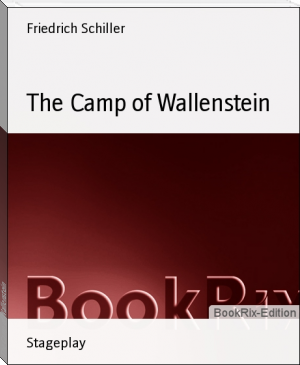
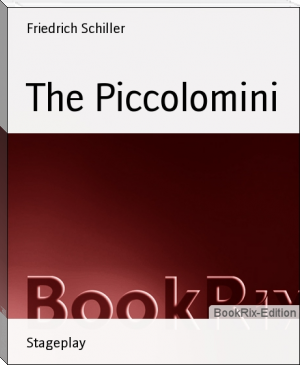
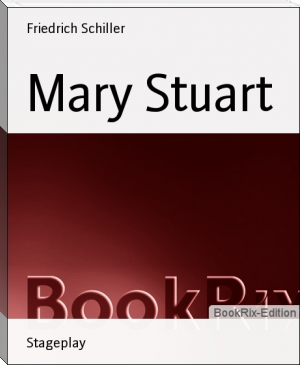
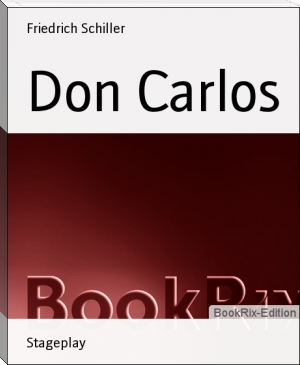

Comments (0)